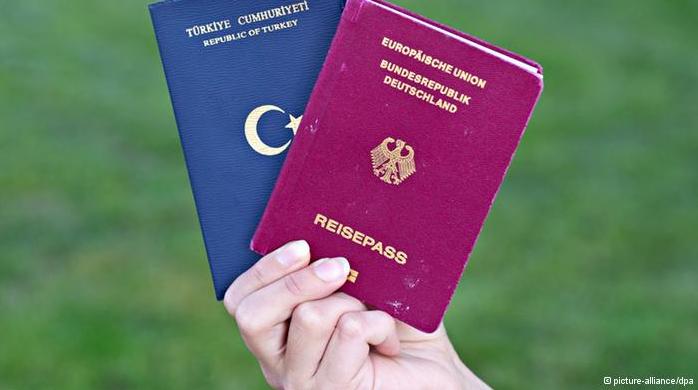Europe Dual citizenship in Germany
德國 雙重國籍在德國
Jus sanguinis revisited
血統主義死灰復燃?
How not to treat people with more than one passport
怎樣不來對待擁有多重國籍的人
Backing Turkey and Germany together
期望土耳其能與德國“聯姻”
The case of a woman from Hanau, in Hesse, shows why Kenan Kolat, leader of Germany’s Turks, calls the German citizenship law “absurdity cubed.” Born in Germany to Turkish parents, she was a dual citizen. According to the law, she had to relinquish one passport between her 18th and 23rd birthday. She chose to forgo the Turkish one. But the Turkish bureaucracy was slow, her birthday came—and her German citizenship went instead.
一位來自哈瑙的女士在海賽的親身經歷,向我們解釋了德國土耳其社區組織的領袖Kenan Kolat認為德國《國籍法》“荒謬至極”的原因。作為出生在德國的土耳其人,她具有雙重國籍。但依據國籍法規定,她必須在18歲到23歲期間選擇放棄一個國籍。德國國籍是她最終的選擇,但是由于土耳其相關機構辦事緩慢,直到她生日那天,她的德國國籍也沒有生效。

International law has never fully embraced multiple citizenship. Many countries frown on it, though others take a more relaxed attitude. Germany, however, manages to make it especially complicated for citizens of foreign origin. Its traditional approach goes back to a law passed before the first world war. Based on jus sanguinis (“right of blood”), it gave citizenship to anybody of German descent, but not to foreigners born in Germany, as countries such as America and France that practise jus soli (“right of soil”) do. Then, in 1999, a centre-left government added the two notions together. This would have let a woman born in Germany to Turkish parents be simultaneously German and Turkish. But that law coincided with a regional election in Hesse, where the centre-right Christian Democratic Union (CDU) seized on the issue to mobilise its conservative base in opposition. The CDU won the state and took control of the upper house, where it blocked the new law.
國際法從來沒有真正包容過多重國籍。盡管有一些國家允許自己國家的人擁有多重國籍,但還是有很多國家不承認多重國籍。而德國對外籍人申請申請加入德國國籍的條件十分嚴苛,最傳統的辦法還要追溯到一戰前通過的法條。依據 jus sanguinis(“血統主義),擁有德國國籍公民的后代自動擁有德國國籍,但是出生在德國的外籍子女并不能獲得德國國籍。而像美國、法國等國家則實行 jus soli (“出生地主義”)。隨后,1999年,德國左翼黨將這兩種方法都采納了進來。這樣,出生在德國的土耳其后裔就能同時獲得德國和土耳其國籍。但是這新法條的頒布正好與在海賽舉行的地區大選的時間不謀而合。在海賽,右派保守黨基民黨(CDU)抓住了這個問題不放,利用其來動員保守方反對法條的通過。最終CDU贏得了大選,控制了高層,并且封鎖了新法條的頒布。
A compromise was reached in 2000. Children born in Germany to foreign parents after 1990 can get two passports but have to choose one citizenship before they are 23. This year, the first cohort of such children, about 3,300, reach that age. From 2018 the number will reach 40,000 a year or more. There are about half a million such cases all told, more than two-thirds of them of Turkish descent.
然而,在2000年,德國《國籍法》卻做出了讓步。在1990年之后出生在德國的外籍子女能夠獲得雙重國籍,但是必須在他們23歲之前做出選擇哪個國籍的決定。這一年,符合年齡標準的第一批試點孩子大約有3300人。預計到2018年,人數會增加到每年40000人甚至更多。已經知曉的大約有50萬這樣的案例,其中超過三分之二的人是土耳其后裔。
Yet not all young dual citizens must choose. A child born to a German parent in America, say, retains both passports for life. So does a child born to a Greek or Spanish parent in Germany, because dual citizenship is allowed for members of the European Union and Switzerland. This seems unfair to the Turks. This week Recep Tayyip Erdogan, the Turkish prime minister, said as much to Angela Merkel, Germany’s chancellor, during her visit to Turkey. (Mrs Merkel also explained that, though happy for Turkey’s EU accession talks to continue, she retained her “scepticism” about its ever becoming a member.)
而今,不是所有擁有雙重國籍的年輕人都必須做出選擇國籍的抉擇。據一位出生在美國的德國小孩所稱,他可以終生保留雙重國籍。出生在德國的希臘或西班牙小孩同樣也能獲得這樣的待遇,因為雙重國籍已經被允許發放給歐盟成員國以及瑞士的公民。這樣似乎對土耳其人并不公平。本周,在德國總理Angela Merkel訪土期間,土耳其總理Recep Tayyip Erdogan傳遞了上述意圖。(默克爾女士也表示,雖然很高興看到土耳其加入歐盟談判得以繼續進行,但是她對土耳其加入歐盟仍保持“懷疑”態度。)
Besides being unjust and creating two classes of citizens, the law is a nightmare to administer, says Ulrich Kober at Bertelsmann Stiftung, a think-tank. Because countries like Iran do not let citizens renounce their citizenship and others make it costly or difficult, German law in theory grants exceptions. But the rules are not clear, reckons Kay Hailbronner, a lawyer. To make the decisions even more arbitrary, the 16 German states process the paperwork, and each uses different forms.
新法條的頒布不僅僅是一種不公平的表現形式,并且在市民中劃分出了2種階級,而且還是管理者的噩夢,Bertelsmann Stiftung的一位智囊團成員 Ulrich Kober這樣說道。由于像伊朗這樣的國家不允許其居民放棄伊朗國籍,而其他人要想取消伊朗國籍也是件困難的事且費用昂貴,所以德國國籍法按理應該允許例外情況,但事實上,法條中規定地十分模糊,Kay Hailbronner律師這樣認為。德國的16個州甚至獨立處理法條的相關文件,并且各自使用不同形式的文件,結果決策變得更加隨意。
What better way to irritate those citizens whom Germany’s politicians say they want to integrate? Mr Kober thinks Germany should simply allow dual citizenship. So do the centre-left parties hoping to replace Mrs Merkel’s government in September’s election, as well as the CDU’s coalition partner, the Free Democratic Party. It may yet happen.
如德國的政治家所言,有什么更好的辦法能夠安撫那些想要融入德國的居民呢?Kober先生認為德國要做的不過是簡簡單單地允許雙重國籍。就像希望能在9月份的大選中擊敗默克爾政府、基督教民主聯盟和自由民主黨的左黨一樣。它總有一天會實現的。翻譯:朱大素












